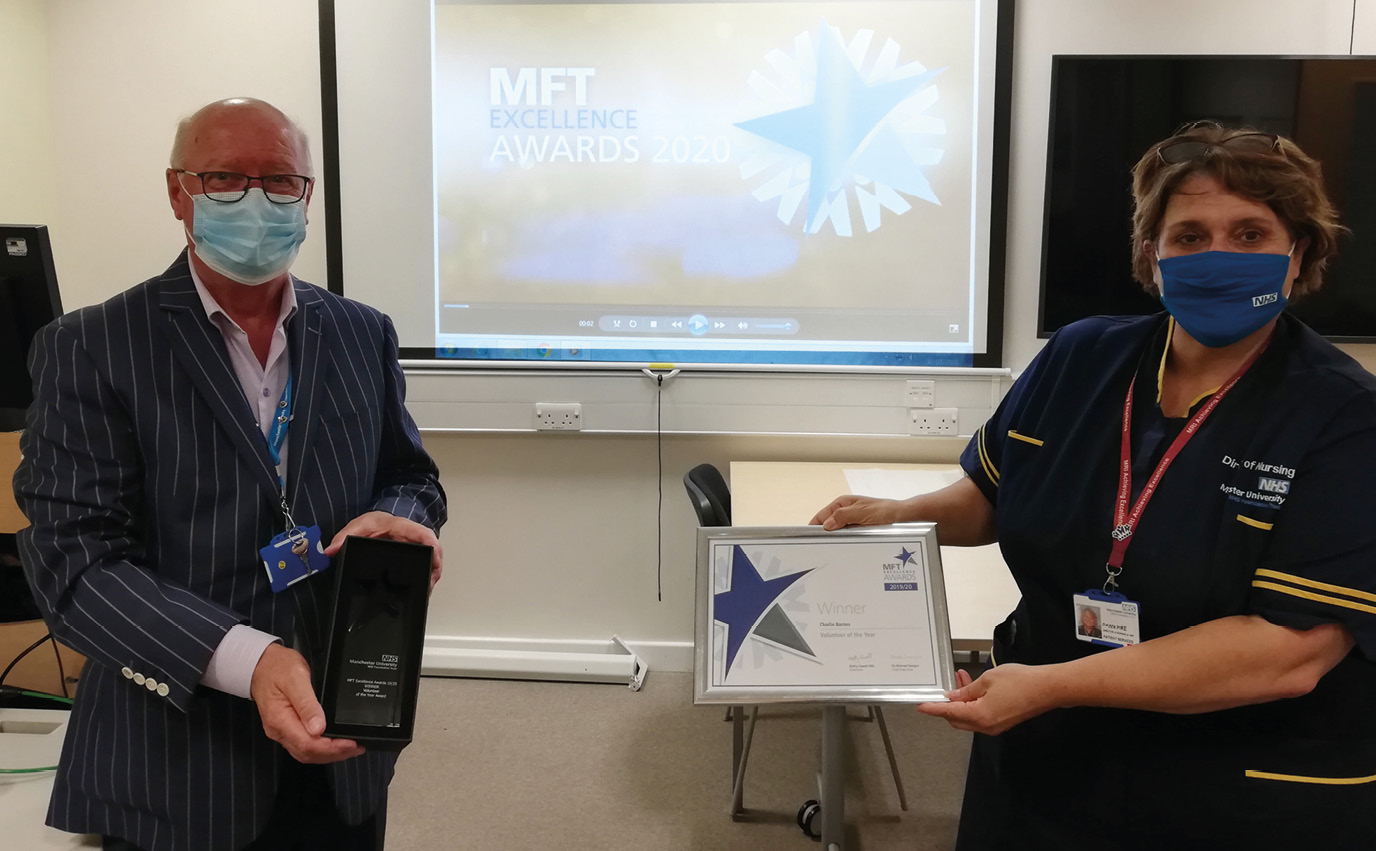
Charlie Barnes is a humanist volunteering as a non-religious pastoral carer at the Manchester Royal Infirmary, providing valuable support as part of the hospital’s chaplaincy team. He is also the recipient of the Manchester University NHS Foundation Trust Volunteer of the Year Award 2020 – given to individuals who work ‘tirelessly and generously to help improve NHS services, facilities, and support for patients’. We caught up with Charlie to talk about his role as a non-religious pastoral carer, his views as a humanist, and winning the award.
Hi Charlie, what first drew you to volunteering with the NRPSN?
I had been a member, but not a very active one, of Humanists UK for a number of years. Just as the time to retire from paid work was approaching, I heard about the opportunity to do a weekend course with the Non-religious Pastoral Support Network, and for the first time saw the chance to become actively involved in humanism – rather than simply giving financial support. I attended the course in York in December 2016, and realised immediately that I had found the right place for me.
How does pastoral care relate to your view of life as a humanist?
Pastoral care in a hospital context has made me realise how we are all bound together as humans, how much our needs and fears are common to all of us, and very often how superficial our apparent differences are. The differences between those of faith and those with none, or between one belief system and another, although they can occasionally cause real passion and anger, are mostly far less apparent than the common need for help, empathy, and support, to which everyone should be equally entitled.
Why, in your view, is humanist pastoral care essential?
Given the universality of these needs, the pastoral care offered in hospitals should be available, and should be seen to be available, to all patients and staff equally. Religious chaplains do a fine job but are often called to look after their own, and the system of referrals in place in a hospital works well – so that every Catholic gets to see a priest. But the inevitable downside of this is that those with no particular religious affiliation fall through the cracks, and often don’t get visited at all. There is also a lack of awareness of non-religious pastoral care. The very idea of non-religious pastoral care is still a novelty for most people, so the likelihood of a patient asking for it, or the staff recommending it, is very low. I would like to set up a system whereby every single person admitted to hospital is visited by a pastoral carer during their first week, to make them aware of the care and support that is available to them, from a diverse and inclusive team. It would then be their choice whether or not to pursue the contact.
Congratulations on winning your recent award. Can you tell us more about it?
Last summer I had heard rumours that I had been nominated for an award of some sort, and it gradually emerged that one of my colleagues in the chaplaincy team had nominated me as Volunteer of the Year 2020. I am of course delighted to receive the Volunteer of the Year Award, it’s a big thrill and I take it as a compliment to the whole team. If it raises the profile of the NPRSN and what the team does – that can only be a good thing!
What have you learned from your experiences with the NRPSN?
I’ve learned that the vast majority of people are good, brave, and optimistic, even when faced with pain, illness, and death, and that these qualities are every bit as apparent in those with no faith as in their religious counterparts. Atheism is not a word I hear very often – it has too much finality for most people – but the idea that people are somehow drawn to religion when confronting their own or their loved one’s mortality is simply not the case! The scenario of an atheist specifically requesting non-religious care still doesn’t happen very often, as they don’t know the care is there, but in any case I would much rather be there for everyone.
I am very lucky working in a team of chaplains who almost unreservedly respect my position and my views on where chaplaincy could go in the future. I have learned that the importance and significance of religious differences gets far too much press; the people I work with are good, kind, committed people, and that matters to me far more than any doctrinal differences that might separate them. A hospital is an environment where everyone is helping with the healing process, not an opportunity for proselytising, and everyone on the team knows that.
I look forward to getting back to work, and if this award does anything to raise the profile of the NRPSN, and to demonstrate the value of having a non-religious pastoral carer in the team, then I am proud to have helped with that.
If you are interested in training to be a non-religious pastoral carer, please contact our Head of Humanist Care, Jessica Grace, on jessica@humanists.uk.

